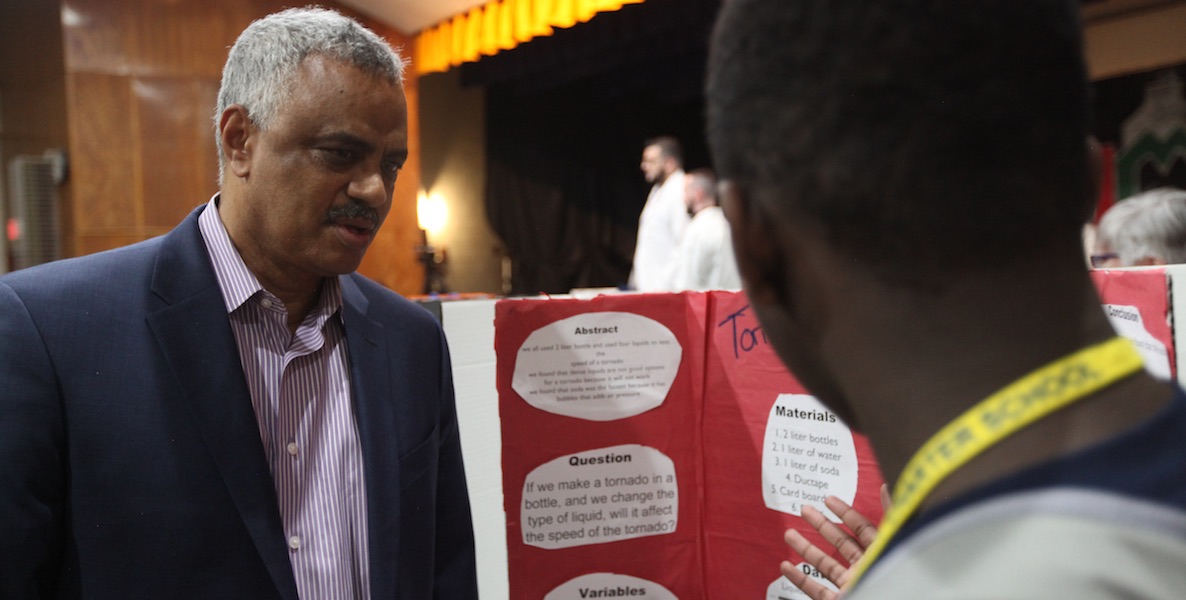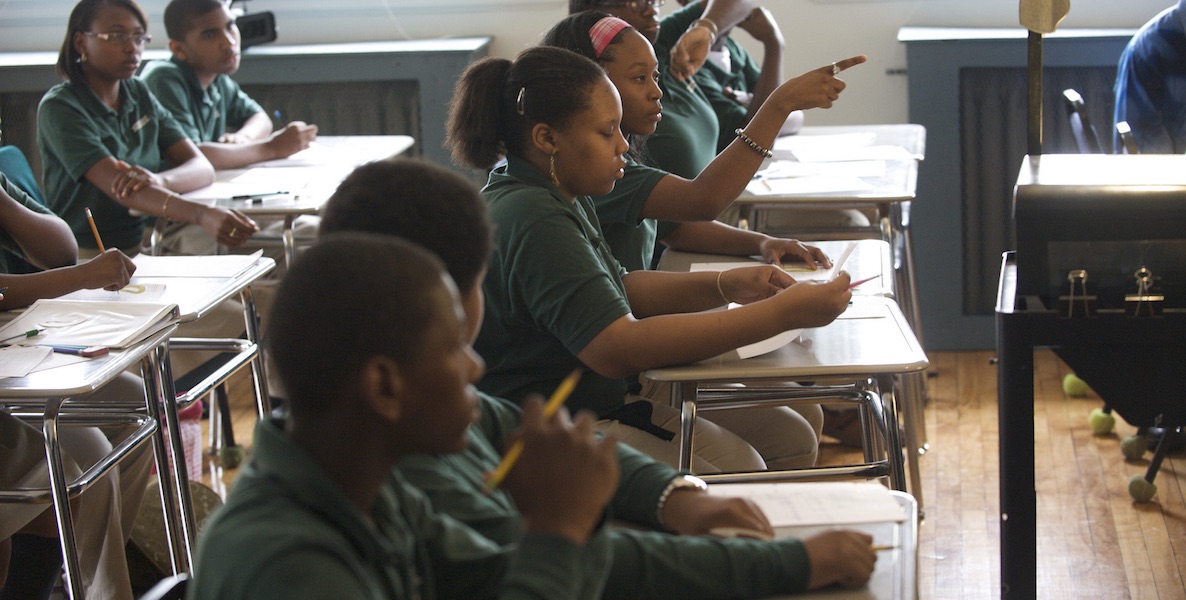In early spring, at Boys’ Latin of Philadelphia Charter School, a sort of tension pervades the halls, familiar to anyone who has spent time in a high school that considers itself a college prep program. College acceptance letters have been trickling in, the reward for four years of long school days, high expectations and intense academic rigor—including a lot of Latin. It’s the end of one tense period, and the beginning of another—college itself. And for the seniors at Boys’ Latin, it’s a glimpse of a future that is out of reach for the majority of Philadelphia public school students, especially when those students are black and male—a future lived in comfort and upward mobility, rather than one that stagnates with far fewer prospects.
To get there, though, those boys must not only get in to college—they must also graduate. And that is no small thing—even for the graduates of Boys’ Latin, where an average of 84 out of 100 students enroll in college. This spring, six years after the charter’s first class graduated, 20 percent of their former students, all black boys, are projected to get a college degree. For the second graduating class—which will reach six years post-high school next June—that number is on track to double, to 50 percent, says Kerry Woodward, the school’s director of strategy and development. That’s still not as many students graduating college as Boys’ Latin would like to see—but it far outshines what’s happening in the rest of the Philadelphia School District.
People with a certification earn 9 percent more than those with just a high school degree; an associates degree brings in 22 percent more; and a bachelors 45 percent. “Kids are exiting high school with no mechanism for entering the labor market,” Harrington says.
In February, Boys’ Latin—along with City Councilwoman Jannie Blackwell and State Senator and former mayoral candidate Anthony Williams—launched #blackdegreesmatter, a campaign to draw attention to the sorry state of college graduation among African American men from Philadelphia. Blackwell held a Council hearing on the issue in late March, with testimony from educators, academics and students.
Woodward says the group is now pushing the District to track and release college matriculation and graduation rates, by race and gender. And then they hope to use that information to understand why black boys are less prone to success, and to make real changes to how and what they are taught, so they are better prepared, district-wide. School District spokesman H. Lee Whack, Jr., says the District has started tracking college graduation rates, starting with the high school class of 2013—so 2019 will be the first time six-year stats are available.
![]() Woodward acknowledges that #blackdegreesmatter is, partly, a self-serving campaign to raise awareness of Boys’ Latin’s “value proposition,” at a time when the School Reform Commission is set to decide whether to renew the school’s charter. But it is also a conversation long overdue in the city of Philadelphia. As Woodward says, “There’s a citywide crisis that needs to be addressed.”
Woodward acknowledges that #blackdegreesmatter is, partly, a self-serving campaign to raise awareness of Boys’ Latin’s “value proposition,” at a time when the School Reform Commission is set to decide whether to renew the school’s charter. But it is also a conversation long overdue in the city of Philadelphia. As Woodward says, “There’s a citywide crisis that needs to be addressed.”
In 2015, Drexel University School of Education professor Paul Harrington published Diplomas to Degrees, a seven-year longitudinal study of about 9,000 Philadelphia public school students who were expected to graduate high school in 2007. (The study did not include charter school students.) Of the students who graduated high school—a number that hovers around 60 percent—Harrington found that 13 percent of African American males got some sort of post-secondary degree (compared to 19 percent of black females, and 20 percent of the general population). Of that cohort, only 8 percent of young black men got four year college degrees—a total of 218 students. (Among all city students, slightly under 500 men got degrees, and more than 800 women.) The rest got technical certifications, qualifying them for jobs as medical or dental assistants, for example.
Put another way: 87 percent of black boys who graduated high school in Harrington’s study got no post-high school training of any kind. That means their earning potential will never rise to the same level. Harrington says people with a certification earn 9 percent more than those with just a high school degree; an associates degree brings in 22 percent more; and a bachelors 45 percent. “Kids are exiting high school with no mechanism for entering the labor market,” Harrington says.
“Disconnected youth in this town is a massive problem,” Harrington says. “College outcomes for young black men is really important.”
This is about more than sending and graduating kids from college. This is about our entire way of educating students in public schools. The purported goal of high school in Philadelphia, and America in general, is college prep. At least, that is the only way to explain the way kids are taught—with an emphasis on testing for academic skills like reading, writing, and math. These are all vitally important life skills, to be sure, and Harrington says studies show that students who are good readers, for example, fare better than those who are not, regardless of their post-high school progress. But our schools, particularly in Philly, are not training a huge swath of students to succeed in college—and also not training non-college bound children for the workforce in any way.
![]() “College and career-readiness is a goal for the District,” spokesman Whack says. “African-American male rates need to be better. We are working on increasing those.” But Whack says success in college depends on the college they attend—not on the high school. “College success, including graduation, is something that a school serving students in secondary grades does not have a direct and primary responsibility for,” Whack says. “This rests with the post-secondary institution.”
“College and career-readiness is a goal for the District,” spokesman Whack says. “African-American male rates need to be better. We are working on increasing those.” But Whack says success in college depends on the college they attend—not on the high school. “College success, including graduation, is something that a school serving students in secondary grades does not have a direct and primary responsibility for,” Whack says. “This rests with the post-secondary institution.”
This is undoubtedly true to some extent. But Harrington, a labor markets and policy specialist, says his research shows that high school performance is a huge determinant of college success. In particular, Harrington says, college graduation is linked to average daily attendance in high school; high school GPA; and whether students immediately enroll in college. (A gap year for city kids is disastrous, he notes.) This is irrespective of race. In fact, when all those factors are equal, Harrington says, black boys are actually more likely to enroll than their white or Asian peers, though he does not know why this is.
“High school tees you up to succeed in college,” Harrington says. “Kids who show up everyday; who attend schools that are stable, with low student churn; who have high basic skills as measured by PSSAs and GPA are all powerful predictors of who’s getting a college degree.”
This, Woodward says, is the promise of Boys’ Latin, a school that is remarkable in many ways. For one thing, it is the city’s only all-boys public school. It has extended hours that have kids at school until 5 p.m. three days a week, and a little less than half of students there for a few hours on Saturday, for extra tutoring. Its students hail primarily from West Philly, where it’s located, and are 99 percent African American. “Because it’s all black boys, the guys here don’t have to imagine a black boy as valedictorian, or as head of student council,” Woodward says. “All the leaders here are black boys.”
And it is—true to its name—a school in which learning Latin is front and center. The school boasts more Latin teachers than any full district in the state, and incorporates the classics in every aspect of its curriculum. Why Latin? “Because it’s hard,” Woodward says.
Boys’ Latin founders David Hardy, a former deputy CEO of Community Academy Charter School, and local education reformer Janine Yass met when their sons were students at The Haverford School on the Main Line. (Several board members also have sons who are Haverford alums.) Along with local businessman Richard Williams, another Haverford parent, they sought to bring a Haverford-type classical education to the young men of inner city Philadelphia. They toyed with opening a private school, but opted instead for a charter, which opened to 9th graders in 2006; Hardy is CEO. In 2013, Boys’ Latin added a middle school, in a separate building a few blocks away in West Philadelphia.
College graduation is linked to average daily attendance in high school; high school GPA; and whether students immediately enroll in college. This is irrespective of race. In fact, when all those factors are equal, Harrington says, black boys are actually more likely to enroll than their white or Asian peers.
Boys’ Latin is heralded by many as one of the more successful charter schools in the city, but it is not without its critics. About 160 students enter 9th grade at Boys’ Latin, including 100 who come straight from the middle school. Of those, around 100 graduate. Unlike other charters (or public schools), Boys’ Latin doesn’t fill its vacancies with other students. Partly, Woodward says, that’s because of the Latin: Throwing kids into Latin class in the middle of the year is not a path to success. But Hardy, who is retiring in June, has also been clear that his mission is not to educate all boys equally in Philadelphia. It’s to give the ones he has the best possible education he can, starting in 9th grade and ending in college graduation. (Woodward says the school has now started to accept more students in the beginning of 7th, 8th and 10th grades.)
![]() But Boys’ Latin has also struggled with one important metric: Test scores. In particular, Boys’ Latin students have scored poorly on Keystone Exams, the tests that the state has said will become a requirement for graduation in Pennsylvania in the near future. These tests, along with PSSAs, are also a significant part of charter school evaluations—something especially pertinent to Boys’ Latin this year, with its license up for renewal. (They are also, Harrington says, one determinant of college success.)
But Boys’ Latin has also struggled with one important metric: Test scores. In particular, Boys’ Latin students have scored poorly on Keystone Exams, the tests that the state has said will become a requirement for graduation in Pennsylvania in the near future. These tests, along with PSSAs, are also a significant part of charter school evaluations—something especially pertinent to Boys’ Latin this year, with its license up for renewal. (They are also, Harrington says, one determinant of college success.)
Woodward says the school in 2014 hired a teacher leader to help hone curricula towards the Common Core, the basis for standardized tests. And she says their numbers are on the rise: The percentage of students proficient in math increased from 24 percent in 2013, to 55 percent in 2016; in ELA from 33 percent to 68 percent; and in science from 3 percent to 26 percent. That is significantly better than the average of the neighborhood public schools—at 11.4 percent, 24 percent and 3.4 percent proficiency for math, ELA and science—but they are not, even Woodward admits, good.
Except high test scores is not what Boys’ Latin is aiming for. “Our mission is not to get guys to perform well on standardized tests,” Woodward says. “Our mission is to get guys to succeed in college.” In that regard, Boys’ Latin already is projected to exceed both the District average and the national average—around 33 percent—for black men in their second graduating class. “We want to send that message to the School Reform Commission,” she notes.
Whack, at the District, says it’s too soon to count on those graduation numbers, and that the charter office does score schools on “college readiness outcomes” including high school graduation rates, attendance, SAT/ACT performance, and AP coursework.
For Boys’ Latin students, college success is about more than what and how they learn. It’s also about the process of finding the right college. The school has not one, but two college counselors, who, starting when they’re in 9th grade, work with boys and their families to find the perfect fit—academically and financially. That is an advantage not given to students of any color, and any gender, at most public high schools in the city.
As a life goal, high school graduation is a pretty low bar, especially given how ill-prepared that leaves so many young adults. Do #blackdegreesmatter in Philadelphia? Only if Philadelphians start to recognize what Harrington has concluded from his work: “Disconnected youth in this town is a massive problem,” he says. “College outcomes for young black men is really important.”
Corrections: A previous version of this story misstated David Hardy’s titles at Community Academy Charter and Boys’ Latin. He was deputy CEO at Academy, and is CEO at Boys’ Latin.
Header photo: Cristo Rey Philadelphia Highschool students Carlos D. and Stephan S.





